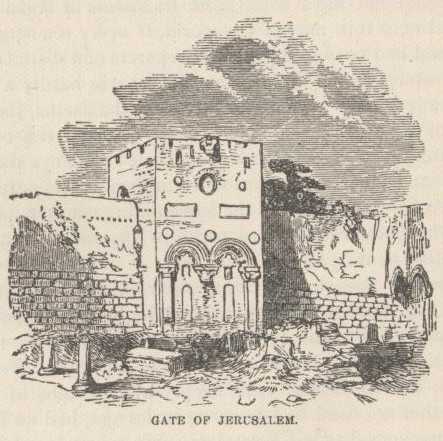September 23 Monday Sam and group left Lubban at 2:30 AM and reached Jerusalem at noon.
About daylight we passed Shiloh, where the Ark of the Covenant rested three hundred years, and at whose gates good old Eli fell down and “brake his neck” when the messenger, riding hard from the battle, told him of the defeat of his people, the death of his sons, and, more than all, the capture of Israel’s pride, her hope, her refuge, the ancient Ark her forefathers brought with them out of Egypt. It is little wonder that under circumstances like these he fell down and brake his neck. But Shiloh had no charms for us. We were so cold that there was no comfort but in motion, and so drowsy we could hardly sit upon the horses.
After a while we came to a shapeless mass of ruins, which still bears the name of Bethel. It was here that Jacob lay down and had that superb vision of angels flitting up and down a ladder that reached from the clouds to earth, and caught glimpses of their blessed home through the open gates of Heaven.
The pilgrims took what was left of the hallowed ruin, and we pressed on toward the goal of our crusade, renowned Jerusalem.
The further we went the hotter the sun got, and the more rocky and bare, repulsive and dreary the landscape became. There could not have been more fragments of stone strewn broadcast over this part of the world, if every ten square feet of the land had been occupied by a separate and distinct stonecutter’s establishment for an age. There was hardly a tree or a shrub any where. Even the olive and the cactus, those fast friends of a worthless soil, had almost deserted the country. No landscape exists that is more tiresome to the eye than that which bounds the approaches to Jerusalem. The only difference between the roads and the surrounding country, perhaps, is that there are rather more rocks in the roads than in the surrounding country.
We passed Ramah, and Beroth, and on the right saw the tomb of the prophet Samuel, perched high upon a commanding eminence. Still no Jerusalem came in sight. We hurried on impatiently. We halted a moment at the ancient Fountain of Beira, but its stones, worn deeply by the chins of thirsty animals that are dead and gone centuries ago, had no interest for us—we longed to see Jerusalem. We spurred up hill after hill, and usually began to stretch our necks minutes before we got to the top—but disappointment always followed:—more stupid hills beyond—more unsightly landscape—no Holy City.
At last, away in the middle of the day, ancient bite of wall and crumbling arches began to line the way—we toiled up one more hill, and every pilgrim and every sinner swung his hat on high! Jerusalem!
Perched on its eternal hills, white and domed and solid, massed together and hooped with high gray walls, the venerable city gleamed in the sun. So small! Why, it was no larger than an American village of four thousand inhabitants, and no larger than an ordinary Syrian city of thirty thousand. Jerusalem numbers only fourteen thousand people.
We dismounted and looked, without speaking a dozen sentences, across the wide intervening valley for an hour or more; and noted those prominent features of the city that pictures make familiar to all men from their school days till their death. We could recognize the Tower of Hippicus, the Mosque of Omar, the Damascus Gate, the Mount of Olives, the Valley of Jehoshaphat, the Tower of David, and the Garden of Gethsemane—and dating from these landmarks could tell very nearly the localities of many others we were not able to distinguish.
I record it here as a notable but not discreditable fact that not even our pilgrims wept. I think there was no individual in the party whose brain was not teeming with thoughts and images and memories invoked by the grand history of the venerable city that lay before us, but still among them all was no “voice of them that wept.”
There was no call for tears. Tears would have been out of place. The thoughts Jerusalem suggests are full of poetry, sublimity, and more than all, dignity. Such thoughts do not find their appropriate expression in the emotions of the nursery.
 Just after noon we entered these narrow, crooked streets, by the ancient and the famed Damascus Gate, and now for several hours I have been trying to comprehend that I am actually in the illustrious old city where Solomon dwelt, where Abraham held converse with the Deity, and where walls still stand that witnessed the spectacle of the Crucifixion.
Just after noon we entered these narrow, crooked streets, by the ancient and the famed Damascus Gate, and now for several hours I have been trying to comprehend that I am actually in the illustrious old city where Solomon dwelt, where Abraham held converse with the Deity, and where walls still stand that witnessed the spectacle of the Crucifixion.